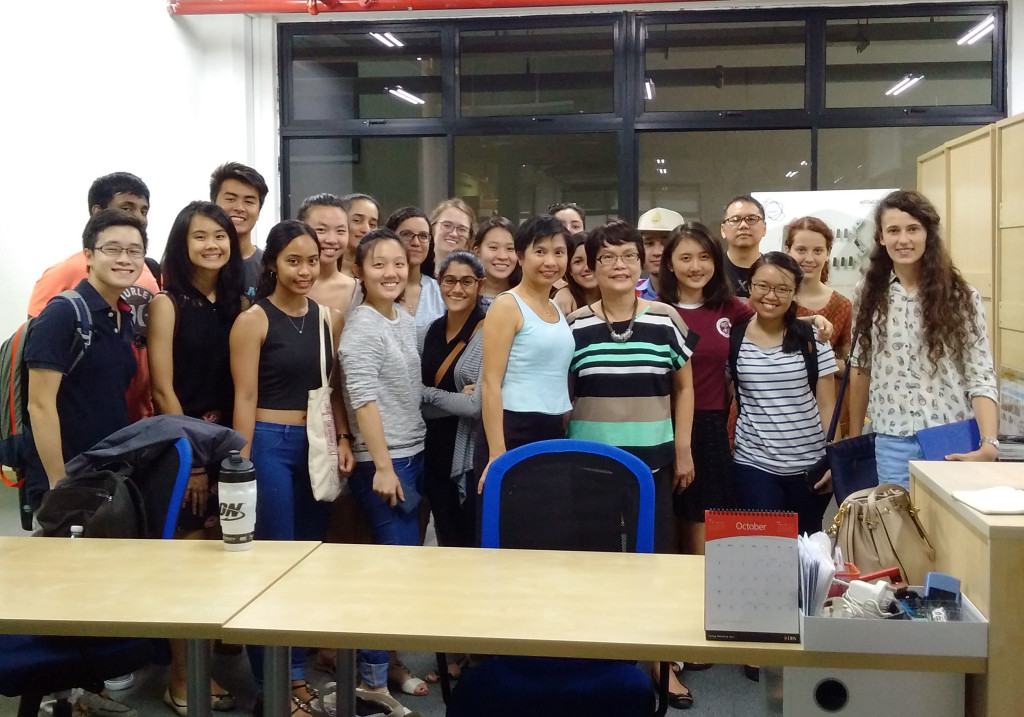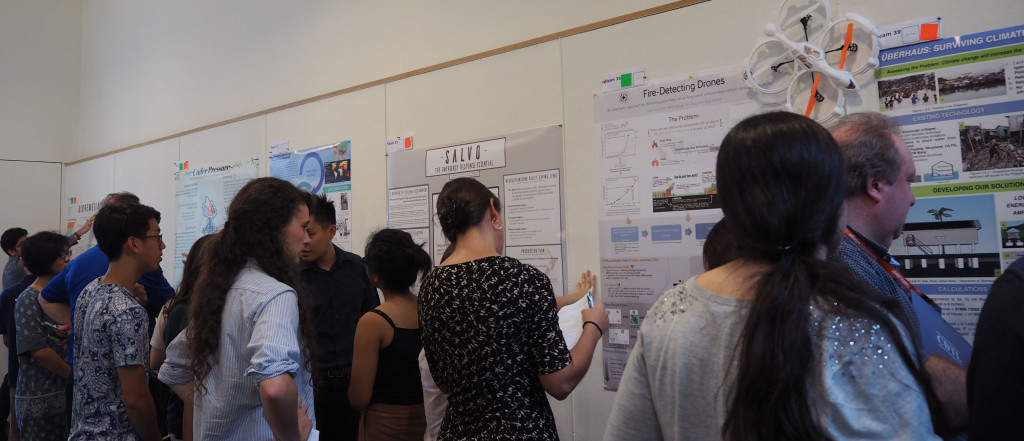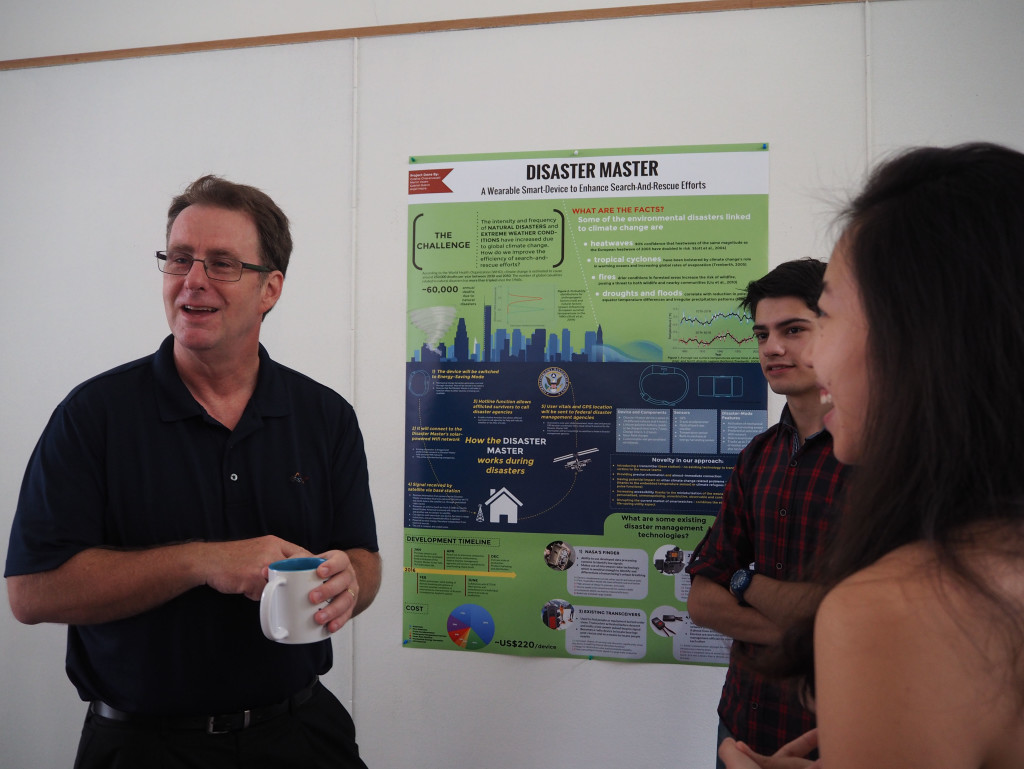Making science a serious business
Fancy wearing a suit that can store energy or using an eco-friendly phone with biodegradable parts to reduce your carbon footprint? Or doing your part to help the earth by using a bio-friendly nanocellulose-based material in place of the current bandage, or a reusable nanostructure antimicrobial film that can prevent the spread of diseases?
Besides being innovative, these solutions are also commercially feasible – two qualities that deeply impressed a group of corporate executives who were at Yale-NUS College in September and November to listen to business plans on sustainable solutions.
A group of Yale-NUS sophomores got a taste of the business world as they put together a business plan detailing their innovation, market analysis, implementation plan and marketing strategy, as they pitched their nanotechnology enabled solutions to a panel of industry representatives. The panel comprised corporate executives from the Agency for Science, Technology and Research (A*STAR), National Research Foundation (NRF), World Wildlife Fund (WWF), ACA Investments, CeEntek Pte Ltd, TechBridges Ventures, and United Overseas Bank (UOB).
The business plan presentation is part of the “Nanotechnology and Sustainability” class in the Foundations of Science module, a key part of the Yale-NUS Common Curriculum. Taught by a team of scholars with expertise in diverse fields such as astronomy, chemistry, nanotechnology, and physics, the Foundations of Science module gives students access to essential concepts of science and trains them to employ that knowledge when looking at interdisciplinary issues.

The Nanotechnology and Sustainability class also brought students to leading R&D institutions and start-ups, where they met nanotechnology research and industry leaders and witnessed innovations first-hand. Image provided by Dr Lerwen Liu
Just like in a real business setting, each team had only 10 minutes to make their pitch, and convince their ‘clients’ why their products are innovative and feasible. During the presentation, they had to field pointed questions such as “Your product seems simple, why hasn’t it been made available already?”, “Who is your competitor?”, and “Who is going to buy this product?”
One panellist who was sold on the innovations was Dr Lu Yuan, Technology Director of Institute of Materials Research Engineering (IMRE), A*STAR who said she would put her money in the ‘Nano-healer solution’, which is a bio-friendly nanocellulose material that can be directly applied to skin and replaces the current cloth bandage.
Students in the class also appreciated the opportunity to develop a business plan and the exposure to the business world.
“After the class, I now have a better understanding of what nanotechnology entails, in particular carbon nano-materials, which is what my group focussed on. Also, our class was very hands-on and I felt that I learnt much through the site visits we went on. That said, the part I enjoyed most would be the business plan project, where groups had to come up with an innovative product that could be marketable and sustainable at the same time. It was very challenging and stretched us to our limits,” said Luke Ong (Class of 2018), whose team designed a wearable suit that is capable of storing energy based on nanocarbon technology.
The class was led by Dr Lerwen Liu, who is also the Managing Director of NanoGlobe. She believes in the importance of helping students connect science and technology to the real world and gain an experience of innovation and entrepreneurship with sustainability in mind.
“Nanotechnology is transforming how things are made and consequently transforming every aspect of our lives. Over the past 10 years, during my journey in nanotechnology, I have learnt more and more every day the responsibility of being able to help our planet become more sustainable, ultimately sustaining humanity. The world is not short of scientific innovation, but what is missing, is transferring those great innovation to design solutions for solving real world problems,” added Dr Liu.
In the spirit of big thinking, the Foundations of Science module also posed a “Grand Challenge” to the students to come up with solutions to the world’s problems. The solutions were presented at a poster fair in November, and students and faculty alike appreciated the opportunity to discuss the ideas in an open forum.

The “Grand Challenge” poster fair at Studio 3, Yale-NUS College. Image by Jeannie Tay

Professor Bryan Penprase in discussion with the team who designed the technology for the wearable device for rescue efforts. Image by Jeannie Tay
From solutions to reduce acidity levels in the ocean, mitigate jellyfish blooms and arrest the problem of a declining honeybee population, the students also came up with designs for a wearable rescue device, nano-inspired material to reduce UV rays at children’s playground, a cocktail solution to ‘eat up’ oil spills, and many more innovative solutions to address the world’s most pressing issues.
Professor Bryan E Penprase, who led the class on “Find and Maintaining a Habitable Planet”, said, “The ‘Grand Challenge’ provides a great opportunity for the students to challenge themselves as they think about major world issues, explore scientific solutions to these issues, and articulate these ideas. The idea of the ‘Grand Challenge’ is to build on this foundation, and as some of these students go on to become science majors, they will acquire deeper scientific knowledge and tools to develop these solutions further. For all of our Yale-NUS students, having the skills to ask creative and original questions that could advance scientific research and technology is extremely exciting, and useful for any future career.”
Professor Penprase was very impressed with the quality of solutions presented at the poster fair, and attributed it to the broad-based learning that the students were exposed to at Yale-NUS. “We are doing serious science here with real world applications that will hopefully benefit many,” added Professor Penprase.





